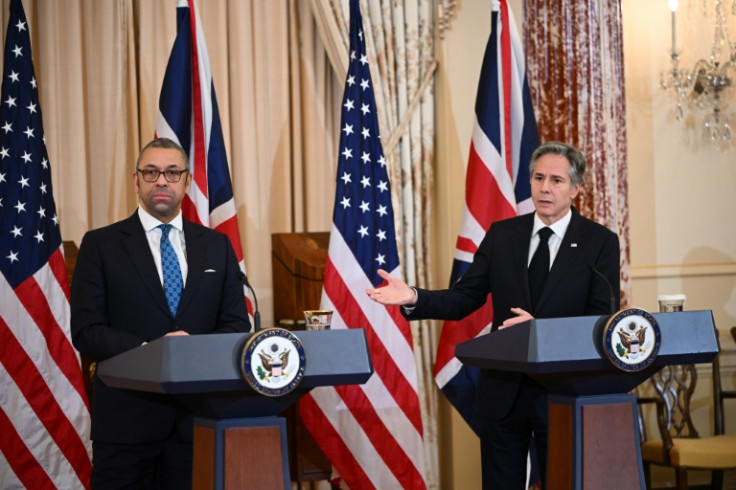Blinken and Cleverly signal foreign policy consensus between Britain and US
In a joint statement following their meeting in Washington, British Foreign Secretary James Cleverly and US Secretary of State Antony Blinken indicated consensus on the conflict in Ukraine and foreign policy approaches to China.

Yesterday, on the 9th of May 2023, British Foreign Secretary James Cleverly met with the United States Secretary of State Antony Blinken to discuss a range of issues, including the conflict in Sudan, the Russo-Ukraine war, and China.
As you might expect from two allies who have had a historically close diplomatic relationship, the pair highlighted the consensus in their view of the world and approach to foreign policy.
Sudan
After a brief introduction, in which Blinken referred to the recent coronation of King Charles as "something that captivated millions and millions of Americans," the US Secretary of State thanked Britain's evacuation efforts in Sudan which have transported over 2,000 people away from the war-torn country. Blinken explained that Britain and the US are working together to bring about a ceasefire and to allow Sudanese people to access "life-saving aid".
On the issue of Sudan, Cleverly explained that "the very strong bilateral relationship that our two countries enjoy" is crucial for allowing multiple international issues to be addressed simultaneously, with conflict in Ukraine also consuming the attention of foreign policy decision-makers.
Ukraine
Next, Blinken addressed the ongoing war in Ukraine, applauding the commitment made by Britain to repeat the $2.3 billion investment into military support provided during the first year of the war in 2023. He also highlighted the "hand in hand" work by Britain and the US to provide support to Ukraine.
Referring to the Black Sea Grain initiative, Blinken went on to accuse Russia of "using people's hunger as a weapon in their war against Ukraine."
The Black Sea Grain Initiative is designed to allow exports of commercial food and fertiliser via three Black Sea ports in Ukraine: Odesa, Chornomorsk and Yuzhny/Pivdennyi. The pair agreed on the need to urgently "extend and expand" the initiative.
According to Blinken, Russia has "returned to blocking ships" accessing Ukrainian ports, preventing the collection of grain. This has consequences for global markets, he explained, with people in Africa, the Middle East, and elsewhere across the world denied access to food.
Cleverly echoed the views of Blinken, emphasising that Russia "should re-sign the Black Sea Grain Initiative and do so immediately."
China
Next, referring to the recent publication of the Integrated Review Refresh 2023, Blinken highlighted the "very, very close strategic alignment" that he sees between Britain and the US.
He referred to Cleverly's recent Mansion House speech which set out Britain's position on China, pointing to the consensus between Britain and the US over the "shared approach" to ensure "peace and stability across the Taiwan Strait," whilst also "looking for ways to cooperate with China" on "big challenges" where there is scope for joint action.
Grounded in the analysis of the Integrated Review Refresh 2023, Cleverly explained the key points of his China speech.
Firstly, the need to defend "against inappropriate activities by China." Secondly, the need to build effective alliances, including with the US and in the Indo-Pacific region. And thirdly, to influence Beijing directly on key issues which affect the rest of the world, including "the maintenance of peace across the Taiwan Strait," climate change, and the prevention of and response to pandemics.
Bilateral Trade
At the end of his speech, Cleverly briefly mentioned the "strong economic ties" between Britain and the US, stating the intention to identify opportunities which enable Britain to act as a "strong economic partner" with the US.
On this subject, Nick Allen of The Telegraph asked Cleverly what measures are being taken "to boost joint economic security and the bilateral investment relationship between the two countries."
This raises the possibility of a post-Brexit free trade agreement (FTA) between Britain and the US. Whilst negotiations for a post-Brexit FTA were held from May to October 2020, no further progress has been made since, with no expectations of an agreement any time soon.
Accordingly, Cleverly responded by explaining that an FTA with the US is not a priority because of the possibility of close economic cooperation in "many areas" which do not require "the traditional kind of tariff-reducing elements of an FTA." Cleverly went on to say that Britain seeks "to build an economic alliance" commensurate with the protection of both British and US interests.
Evidence of the 'special relationship'?
Lastly, what does the meeting tell us, if anything, about the status of the relationship between Britain and the US in 2023?
The phrase "special relationship" was first used by Winston Churchill in 1946 during a speech delivered at Westminster College, in Fulton, Missouri. It refers to the deeper social and political relationship between Britain and the US that has developed throughout history.
Whilst, neither of the pair referred to a "special relationship" between Britain and the US, at the end of his remarks, Cleverly referred to the "mutual interest" of Britain and the US, as well as the rest of the world, that the bilateral relationship across the Atlantic remains a "strong" point of "pride". One which ought to be consolidated to be "even stronger still in the future."
The reference to pride could imply that there is something more to the British-US relationship than cooperation motivated by robotically calculated strategic interests alone. Viewed through the lens of the so-called "special relationship", these comments could imply that cooperation between Britain and the US remains grounded in a common history and common set of values that are something to be proud of for both nations.
© Copyright IBTimes 2025. All rights reserved.





















